|
Klovainiai
A
walk through Jewish Klovainiai, the way it was a few years before 1941.
Chapters:
1 2
3
stories from: Elzbieta
Stefa
Story of
Elzbieta Tamosiunaite,
Klovainiai
(recorded
in August 2004)
|
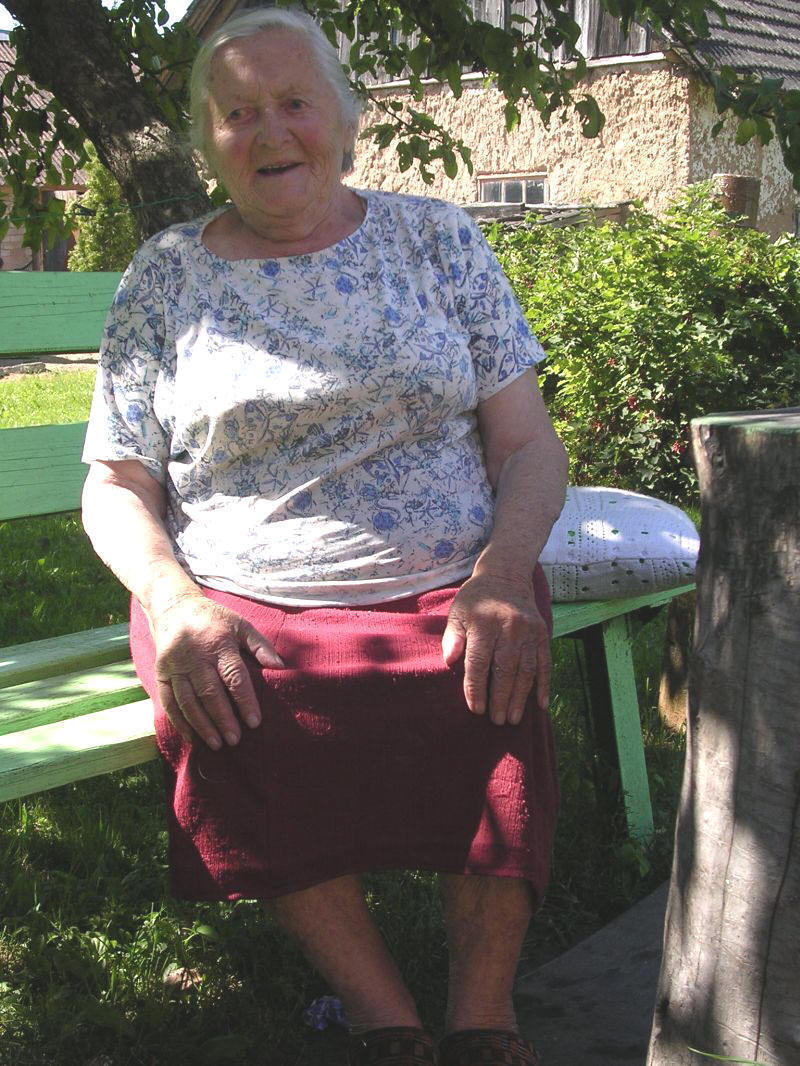 Elzbieta in her garden Elzbieta in her garden
|
As a young girl, Elzbieta was befriended with
Enke Motzkes, the only child
of the couple Motzkes. The father of Enke bought and slaughtered calves. He
sold the meat. The name of Enke’s mother was: Irke, as
Elzbieta recalls. She
said, her mother Irke was a beautiful woman, slender with black hair. She
must have been about 30 years old, then.
|
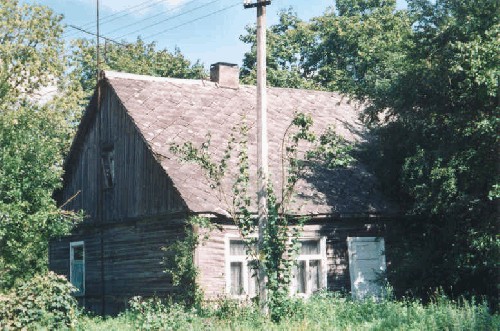 Photo Motzkes'
house (Pušalotasgatve) , but the part we see is the part were
Chaike and her daughter lived. Photo Motzkes'
house (Pušalotasgatve) , but the part we see is the part were
Chaike and her daughter lived. |
|
|
|
|
The family Motzkes shared the building ( which was divided in 2 houses) with
Chaike (or Kaike) (a nick name or her real name, Elzbieta wasn’t sure). Chaike sold bread and other food e.g.herrings. |
|
Elzbieta was always very happy when Enke’s father bought a calf from her
father, so she and her relatives could eat. Her father bought and sold
calves. Elzbieta’s parents had 5 children; life was very tough for them.
They were very poor, said Elzbieta. The family lived at the Linkuvos street.
|
|
Elzbieta and Enke were of the same age and they visited the school together.
After school they very often played together. Elzbieta remembers that the
family Motzkes had always such tasty cheese, made of goat milk. She couldn’t
attend school for the whole period: After 3 years attending school Elzbieta
had to help her parents. Elzbieta’s job was to look after the animals. |
|
Enke finished school. She was a good pupil. There was no Jewish school in
Klovainiai. |
|
Elzbieta told that the Jewish families lived their life as they did and no
one had to do something with the other. The Jewish families were good
people, they didn’t any bad things to us, as she said. |
Once a year, at Pesach, when we had Easter, the Jewish families gave us
matzos and she liked them very much, there were such nice holes in it.
|
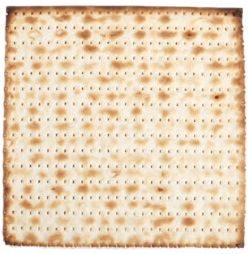 matzo
matzo |
|
There was
no synagogue in Klovainiai and Elzbieta told us, that the Jewish families
went to the synagogue only by horse and wagon. Before going they asked
someone to drive them and paid him. Elzbieta said that the Jewish families
went to the synagogue in Pakruojis to attend the service. |
|
Elzbieta
left her elderly house for Kaunas before the war. |
During the massacre at Morkakalnis and the war she was in Kaunas. From the
house in which she stayed for 5 years, she saw how the Jews were driven to
the ghetto in Kaunas . She saw how some of them reached out their hand and
asked for bread. Later, she saw the lorries with Jewish people in it to be
shot at the Ninth Fort. She didn’t see the killings, but local people told
her about it afterwards. She was very shocked.
|
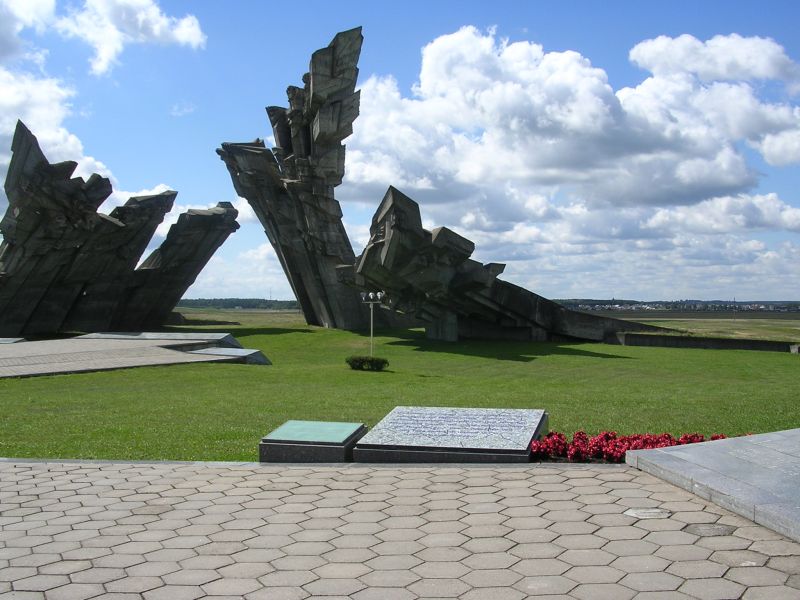 Ninth
fort, Kaunas Ninth
fort, Kaunas |
|
Elzbieta
said, that what she will tell us about the massacre at Morkakalnis and about
the period of the Germans in Lithuania and therefore in Klovainiai, she was
told by her parents:
The
Jewish families of Klovainiai were taken and escorted by Lithuanians , by
people from Klovainiai. They were collaborators. They took them to
Morkakalnis. They were looking forward to receiving all the jewellery and
riches these families should leave behind…
They belonged to the richest farmers of Klovainiai.These collaborators shot
the Jews from Klovainia. |
|
The name
of these murderers are:
|
|
Before
the Jewish families were taken to Morkakalnis, Chaike told a local
policeman: What will be done for us? When will we be taken away and killed? |
|
After the
war these murderers fought as partisans against the Soviets. Only one of
them : Vladislovas Mykolaitis was sentenced by the Soviet Court and he got
10 years emprisonment. He died some years ago.
Elzbieta’s father told her, that he heard the shootings at Morkakalnis even
when he was in the house. The shootings weren’t done in one day, he said. |
|
The houses of the Jewish families were given to three families (or they
confiscated these houses themselves, this Elzbieta doesn’t remember well).
Nowadays, summer 2004, these houses are empty and will be destroyed. ( the
mill and the house were already gone, remember Dermaika’s house (see
chapter2). |
The furniture and the clothes and all the other stuff were exhibited on the
square in Klovainiai. The killers had taken already the best stuff. Now, the
people were allowed to get something for themselves. Elzbieta told us,
people were fighting about it, especially about the clothes. Her father
wanted to go there, too. Her mother cried and said to him ”Don’t take
anything! My heart aches for them. It brings bad luck.” Her father
went and waited till everyone was gone, then he took what was left: a
cupboard. This cupboard is still used by Elzbieta, but if the Jews want it
back, they can have it, she said.
|
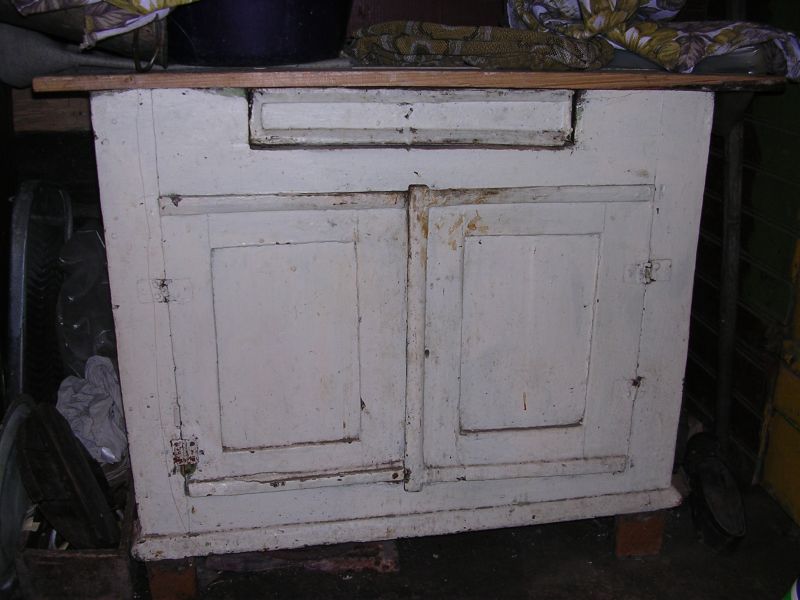 cupboard
cupboard |
 Elzbieta in her garden
Elzbieta in her garden Photo Motzkes'
house (Pušalotasgatve) , but the part we see is the part were
Chaike and her daughter lived.
Photo Motzkes'
house (Pušalotasgatve) , but the part we see is the part were
Chaike and her daughter lived. matzo
matzo Ninth
fort, Kaunas
Ninth
fort, Kaunas cupboard
cupboard